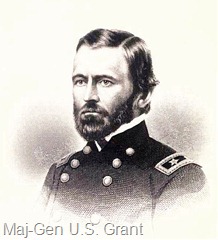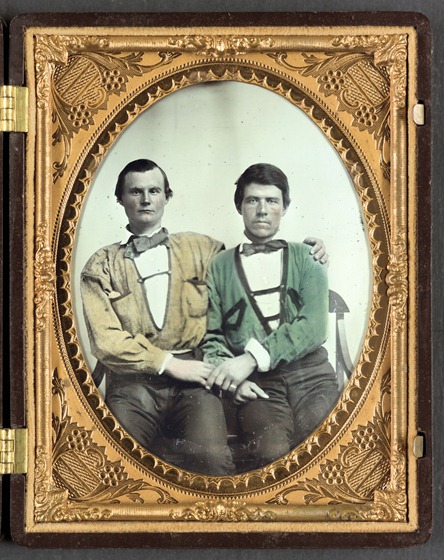OCTOBER 9TH.—Early this morning I was at the depot. The superintendent suggested that I should send some one to Weldon in search of the trunk. He proffered to pass him free. This was kind; but I desired first to look among the baggage at the depot, and the baggage-master was called in. Only two were unclaimed last night; but he said a gentleman had been there early in the morning looking for his trunk, who stated that by some mistake he had got the wrong one last night. He said he stopped at the Exchange, and I repaired thither without delay, where I found my trunk, to the mutual joy of the traveler and myself. It was sent to the cottage, and the stranger’s taken to the hotel. Had it not been for my lucky discovery, we should have had no spoons, forks, etc.
My wife has obviated one of the difficulties of the blockade, by a substitute for coffee, which I like very well. It is simply corn meal, toasted like coffee, and served in the same manner. It costs five or six cents per pound-coffee, $2.50.
I heard a foolish North Carolinian abusing the administration to-day. He said, among other things, that the President himself, and his family, had Northern proclivities. That the President’s family, when they fled from Richmond, in May, took refuge at St. Mary’s Hall, Raleigh, the establishment of the Rev. Dr. Smedes, a Northern man of open and avowed partiality for the Union; and that the Rev. Dr. Mason of the same place, with whom they were in intimate association, was a Northern man, and an open Unionist. That the President’s aid, and late Assistant Secretary of State, was an Englishman, imported from the North; Gen. Cooper, the highest in rank of any military officer, was a Northern man; Col. Gorgas, Chief of Ordnance, was also a Northern man; Gen. Lovell, who was in the defeat at Corinth, and who had surrendered New Orleans, was from Pennsylvania; Gen. Smith, in command of Virginia and North Carolina, from New York; and Gen. Winder, commanding this metropolis, a Marylander, and his detectives strangers and aliens, who sold passports to Lincoln’s spies for $100 each. He was furious, and swore all the distresses of the people were owing to a Nero like despotism, originating in the brain of Benjamin, the Jew, whose wife lived in Paris.
The .Senate, yesterday, passed the following resolutions, almost unanimously:
1st. Resolved by the Congress of the Confederate States of America, That no officer of the Confederate Government is by law empowered to vest Provost, Marshals with any authority whatever over citizens of the Confederate States not belonging to the land or naval forces thereof or with general police powers and duties for the preservation of the peace and good order of any city, town, or municipal district in any State of this Confederacy, and any such exercise of authority is illegal and void.
2d. Resolved, That no officer of the Confederate Government has constitutional or other lawful authority to limit or restrict, or in any manner to control the exercise of the jurisdiction of the civil judicial tribunals of the States of this Confederacy, vested in them by the constitutions and laws of the States respectively, and all orders of any such officer, tending to restrict or control or interfere with the full and normal exercise of the jurisdiction of such civil judicial tribunals are illegal and void.
3d. Resolved, That the military law of the Confederate States is, by the courts and the enactments of Congress, limited to the land and naval forces and the militia when in actual service, and to such other persons as are within the lines of any army, navy, corps, division or brigade of the army of the Confederate States.
Yesterday, the Dispatch contained an article, copied from the Philadelphia Inquirer, stating that a certain person who had been in prison here, arrested by order of Gen. Winder, for disloyalty, and for attempting to convey information to the enemy, had succeeded in obtaining his release; and, for a bribe of $100, a passport to leave the Confederacy had been procured from Gen. Winder’s alien detectives. The passport is printed in the Philadelphia paper, and the bearer, the narrative says, has entered the United States service.
This must have been brought to the attention of the President; for a lady, seeking a passport to go to her son, sick and in prison in the North, told me that when she applied to Gen. Winder to-day, he said the President had ordered him to issue no more passports. And subsequently several parties, government agents and others, came to me with orders from the Secretary (which I retain on file), to issue passports for them. I hope this may be the end of Winder’s reign.
A letter from Gen. Lee states that, in view of certain movements, he had, without waiting for instructions, delivered the sword, horse, etc. of Gen. Kearney, lately killed, to his wife, who had made application for them. The movements referred to we shall know more about in a few days.
Gen. Van Dorn dispatches the department that his army is safe; that he took thirteen guns and 700 prisoners. So it was not so disastrous a defeat. But the idea of charging five times his number!
 October 10, 1862. To-day a force of Union troops, under command of Lieutenant-Colonel John Boyle, of the Ninth Kentucky cavalry, entered Harrodsburgh, Kentucky, completely surprising and taking prisoners one thousand six hundred rebel troops, composed of infantry, artillery, and cavalry, being the rearguard of General Bragg’s army.—Governor Harris, of Tennessee, issued an order requiring the enrolment of all persons between the ages of eighteen and fifty-five, announcing that thirty days would be allowed for volunteering.
October 10, 1862. To-day a force of Union troops, under command of Lieutenant-Colonel John Boyle, of the Ninth Kentucky cavalry, entered Harrodsburgh, Kentucky, completely surprising and taking prisoners one thousand six hundred rebel troops, composed of infantry, artillery, and cavalry, being the rearguard of General Bragg’s army.—Governor Harris, of Tennessee, issued an order requiring the enrolment of all persons between the ages of eighteen and fifty-five, announcing that thirty days would be allowed for volunteering.









